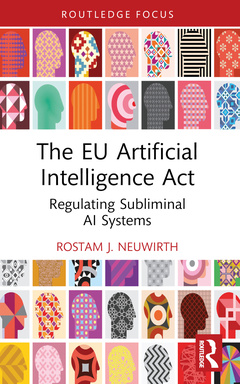The EU Artificial Intelligence Act Regulating Subliminal AI Systems Routledge Research in the Law of Emerging Technologies Series
Auteur : Neuwirth Rostam J.

AI in combination with other innovative technologies promises to bring unprecedented opportunities to all aspects of life. These technologies, however, hold great dangers, especially for the manipulation of the human mind, which have given rise to serious ethical concerns. Apart from some sectoral regulatory efforts to address these concerns, no regulatory framework for AI has yet been adopted though in 2021 the European Commission of the EU published a draft Act on Artificial Intelligence and UNESCO followed suit with a Recommendation on the Ethics of Artificial Intelligence.
The book contextualises the future regulation of AI, specifically addressing the regulatory challenges relating to the planned prohibition of the use of AI systems that deploy subliminal techniques. The convergence of AI with various related technologies, such as brain?computer interfaces, functional magnetic resonance imaging, robotics and big data, already allows for "mind reading" or "dream hacking" through brain spyware, as well as other practices that intrude on cognition and the right to freedom of thought. Future innovations will enhance the possibilities for manipulating thoughts and behaviour, and they threaten to cause serious harm to individuals as well as to society as a whole.
The issue of subliminal perception and the ability to deceive and manipulate the mind below the threshold of awareness causes severe difficulties for law and democracy and raises important questions for the future of society. This book shows how cognitive, technological, and legal questions are intrinsically interwoven, and aims to stimulate an urgently needed transdisciplinary and transnational debate between students, academics, practitioners, policymakers and citizens interested not only in the law but also in disciplines including computer science, neuroscience, sociology, political science, marketing and psychology.
Preface
Introduction
1. The European Union’s Proposed Artificial Intelligence Act (AIA)
A. Background and Context
B. The Prohibition of AI Systems Deploying Subliminal Techniques
C. The Scope and Nature of AI Systems with Subliminal Aspects
2. Subliminal Perception and the Law
A. Motivational Research and "Hidden Persuaders"
B. Laws Prohibiting Subliminal Advertising
C. Subliminal Perception and the Senses: Between Individuality and Unity
3. The Future Regulation of Subliminal AI Systems
A. The Prohibition of Subliminal Techniques in AI Systems, Revisited
B. Wider Ramifications for Law: Towards a Right to Cognitive Freedom
C. Legal Synaesthesia: Greater Unity of the Senses Leads to Greater Unity of Law?
Conclusion
Rostam Josef Neuwirth is Professor of Law and Head of the Department of Global Legal Studies at the Faculty of Law of the University of Macau. Previously, he taught at the West Bengal University of Juridical Sciences (NUJS) in Kolkata and the Hidayatullah National Law University (HNLU) in Raipur (India), and worked as a legal adviser in the Department of European Law of the International Law Bureau of the Austrian Federal Ministry for Foreign Affairs. He received his PhD degree from the European University Institute (EUI) in Florence (Italy), and also holds a Master’s degree in Law (LL.M.) from the Faculty of Law of McGill University in Montreal (Canada). As an undergraduate he studied at the University of Graz (Austria) and the Université d’Auvergne (France). He is the author of Law in the Time of Oxymora: A Synaesthesia of Language, Logic and Law (Routledge 2018) and numerous other publications that focus on contemporary global legal problems by exploring the intrinsic linkages between law, on the one hand, and language, cognition, art, culture, society and technology, on the other.
Date de parution : 05-2024
13.8x21.6 cm
Date de parution : 08-2022
13.8x21.6 cm
Thème de The EU Artificial Intelligence Act :
Mots-clés :
Subliminal Techniques; Ai System; Subliminal Perception; GDPR; Subliminal Advertising; AIA; Subliminal Stimuli; UNESCO Recommendation; Subliminal Persuasion; Audiovisual Commercial Communications; Subliminal Messages; Dark Patterns; Subliminal Priming; Macao Special Administrative Region; Exam Preparation; BCI; Materially Distort; PLD; Grapheme Colour Synaesthesia; CIA’s Activity; Recommender Systems; High Level Expert Group; Rubber Hand Illusion; Somatosensory System
